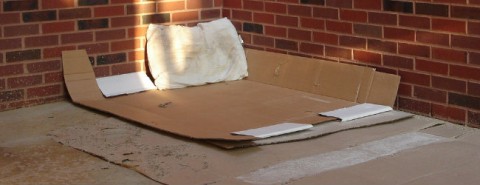Night out in London
I came to St. Martin-in-the-Fields last July. It’s a complex organization; to get to know it I’ve spent time as a concert usher, a sous-chef, a bookstall volunteer and an aide in the day center for homeless and vulnerable people. I spent a half hour each with 50 staff, church members and neighbors, and I even turned out for the cricket team. This is England, after all. So it made sense to spend a night outside.
In the U.S., people who know the name St. Martin-in-the-Fields think of it as an orchestra. When I was appointed as vicar here countless American friends congratulated me on taking over the world-famous academy—and were impressed I’d hitherto kept my musical prowess so quiet. In the U.K., by contrast, people assume St. Martin’s is a homeless shelter. Since 1927 the vicar of St. Martin-in-the-Fields has gone on BBC Radio every December and made an appeal for supporting the ministry to homeless people; this year it brought in a record $3.25 million. It’s not unusual to overhear this conversation in Trafalgar Square: “That’s a beautiful church, and such a great location.” “It used to be a church—they turned it into a homeless center.” The congregation members don’t know whether to feel proud or exasperated.
I had two companions for my night on the streets. One was an overseas national whom I’ll call Tugo; he’d been in this country for a long time but had no prospect of getting citizenship. I know Tugo because when I or one of my colleagues open the church at 7:30 a.m. each day, a dozen or more foreign nationals follow us in to find warmth and shelter and hover around during morning prayer like a cloud of witnesses. They remind me that we’re all homeless, really: we have no abiding city. Tugo is sometimes among them. His friend, whom I’ll call Becky, has a different story: orphaned when young, she’d come to London years ago to trust her own wits more than the unreliable attention of her siblings.





